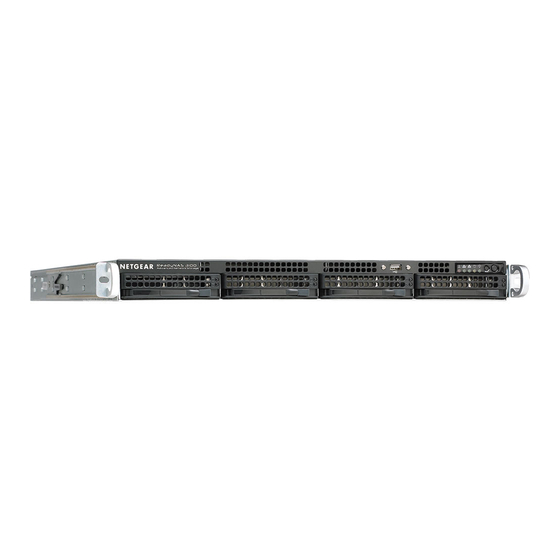
NETGEAR ReadyNAS 3100 Basic Setup & Configuration
Hide thumbs
Also See for ReadyNAS 3100:
- Hardware manual (39 pages) ,
- Software manual (135 pages) ,
- Hardware manual (57 pages)
Advertisement
Quick Links
Installation Guide
NETGEAR® ReadyNAS™ 3100
Basic Setup & Configuration
Follow these instructions to install your NETGEAR® ReadyNAS™ 3100.
NETGEAR® ReadyNAS™ 3100
Estimated completion time: 20 minutes.
Note: These instructions assume the unit is using the factory default X-RAID2 disk
configuration. A unit that does not have the disks pre-installed requires that the disks
be installed and RAID initialized before proceeding. Go to
hcl
for a list of supported disks. Refer to the
ReadyNAS 3100 User Manual
instructions on installing disks and configuring RAID.
First, Install the RAIDar Utility
1.
Install the RAIDar utility from the product
Resource CD
versions for Windows, MAC and Linux.
Next, Connect the Unit and Login
1.
To setup the unit, connect the LAN1 Ethernet port on the ReadyNAS to your
network, and turn it on. It takes about a minute or two to start up. By default the IP
address is retrieved via DHCP. Once found, the assigned IP address will display in
the status area.
2.
Run the RAIDar utility. It will detect the unit, and any other units on the same
subnet.
Tip: In your DHCP server, reserve the IP address assigned for your ReadyNAS so
that it always gets this address. This helps assure that mapped drives work
consistently on any operating system.
3.
Click the RAIDar Setup button to open a
FrontView browser session with the unit. The
login screen will display. The default user name
is admin and the password is netgear1. The
Setup Wizard configuration utility home page
displays.
Run the Setup Wizard
The Setup Wizard will guide you through the basic
configuration and file sharing setup.
Note: If you choose to bypass
the Setup Wizard, be sure to
configure alerts, email address,
change the admin password, and
provide a password recovery
question.
1.
In the factory default state,
when logged in to the unit,
the Setup Wizard is enabled.
http://www.readynas.com/
Click Next to proceed with
for
the wizard.
2.
On the Clock tab page,
modify or accept the default
, which includes RAIDar
timezone, time, and NTP
options. Click Next to
proceed.
3.
On the Alerts tab page,
provide at least one email
address for system alerts.
Click Next to proceed.
4.
On the Ethernet 1 tab page,
accept or change the IP
address settings. Click Next
to proceed.
5.
On the Global Settings tab page, if you want you can modify the unit's
hostname. Also, if you use a static IP configuration, you will need to configure
the gateway and DNS settings (you do not have to change these settings if you
use the unit in its default DHCP configuration). Click Next to proceed.
6.
On the Admin Password page, change the system login password, and provide
a recovery question, answer, and email address. Note these changes. Click
Next to proceed.
7.
On the Security Mode tab page, accept the default option of "User" which
controls access to shares based on user or group accounts. FrontView will
attempt to use the first workgroup name it discovers in the network. Otherwise, it
will default to "VOLUME" as the workgroup name. Specify the workgroup name
you want the unit to join. Refer to the
ReadyNAS 3100 User Manual
setup instructions. Click Next to proceed.
8.
On the Accounts page, click Add User. Add a new user and user password.
Click Next to finish the wizard. Refer to the
ReadyNAS 3100 User Manual
instructions on setting up accounts.
Note: Refer to the
ReadyNAS 3100 User Manual
for additional instructions on
configuration options like backup, streaming media servers, printers, VLAN, user
accounts and quotas.
for ACS
for full
Advertisement

Summary of Contents for NETGEAR ReadyNAS 3100
- Page 1 Basic Setup & Configuration Next to proceed. Run the Setup Wizard Follow these instructions to install your NETGEAR® ReadyNAS™ 3100. The Setup Wizard will guide you through the basic configuration and file sharing setup. Note: If you choose to bypass...
-
Page 2: Technical Support
The bottom row of the FrontView configuration utility provides color coded status © 2010 by NETGEAR, Inc. All rights reserved. NETGEAR and the NETGEAR logo are registered trademarks of NETGEAR, Inc. in the United States and/or other countries. Other brand and product names are indicators of workgroup connections, disks, the fan, temperature, and UPS (if trademarks or registered trademarks of their respective holders.














